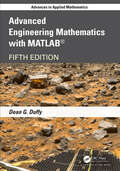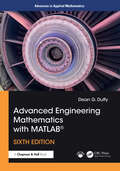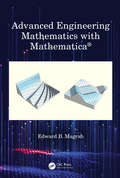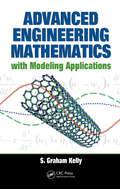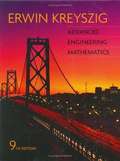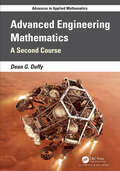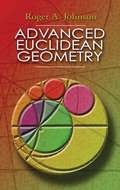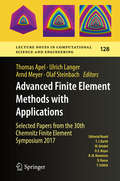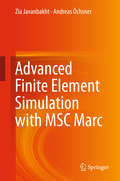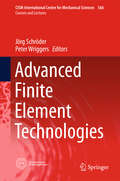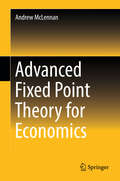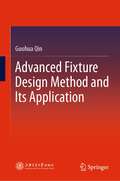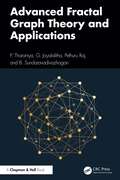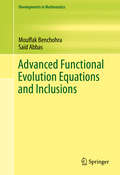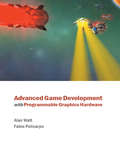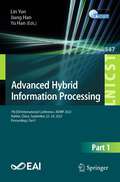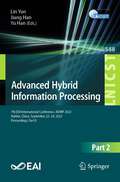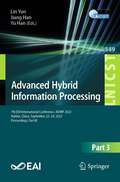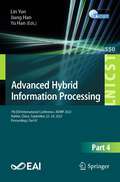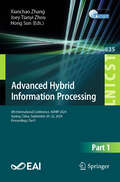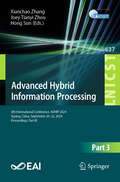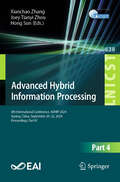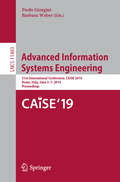- Table View
- List View
Advanced Engineering Mathematics with MATLAB (Advances in Applied Mathematics)
by Dean G. DuffyIn the four previous editions the author presented a text firmly grounded in the mathematics that engineers and scientists must understand and know how to use. Tapping into decades of teaching at the US Navy Academy and the US Military Academy and serving for twenty-five years at (NASA) Goddard Space Flight, he combines a teaching and practical experience that is rare among authors of advanced engineering mathematics books. This edition offers a smaller, easier to read, and useful version of this classic textbook. While competing textbooks continue to grow, the book presents a slimmer, more concise option. Instructors and students alike are rejecting the encyclopedic tome with its higher and higher price aimed at undergraduates. To assist in the choice of topics included in this new edition, the author reviewed the syllabi of various engineering mathematics courses that are taught at a wide variety of schools. Due to time constraints an instructor can select perhaps three to four topics from the book, the most likely being ordinary differential equations, Laplace transforms, Fourier series and separation of variables to solve the wave, heat, or Laplace's equation. Laplace transforms are occasionally replaced by linear algebra or vector calculus. Sturm-Liouville problem and special functions (Legendre and Bessel functions) are included for completeness. Topics such as z-transforms and complex variables are now offered in a companion book, Advanced Engineering Mathematics: A Second Course by the same author. MATLAB is still employed to reinforce the concepts that are taught. Of course, this Edition continues to offer a wealth of examples and applications from the scientific and engineering literature, a highlight of previous editions. Worked solutions are given in the back of the book.
Advanced Engineering Mathematics with MATLAB® (Advances in Applied Mathematics)
by Dean G. DuffyIn the five previous editions of Advanced Engineering Mathematics with MATLAB®, the author presented a text firmly grounded in mathematics that engineers and scientists must understand and know how to use. Tapping into decades of teaching at the US Navy Academy and the US Military Academy and serving for twenty-five years at (NASA) Goddard Space Flight, he combines teaching and practical experience that is rare among authors of advanced engineering mathematics books.This edition continues to refine a smaller, easier to read, and useful version of this classic textbook. While competing textbooks continue to grow, the book presents a slimmer, more practical option to align with the expectations of today’s students.The new edition of the author’s classic textbook continues on a path to creating the best possible learning resource for instructors and students alike. Through extensive class testing over five previous editions, including the author’s current course at the US Naval Academy, the book has been steadily improved.The primary mission of this edition is to dramatically increase the quality and quantity of examples and problems, especially in the chapters on differential equations and Laplace transforms. The chapters on differential equations, linear algebra, Fourier series, and Laplace transforms have seen the greatest changes. Of course, this edition continues to offer a wealth of examples and applications from scientific and engineering literature, a highlight of previous editions.MATLAB® remains central to the presentation and is employed to reinforce the concepts that are taught. Worked solutions are given in the back of the book. An Instructor’s Solutions Manual is also available.
Advanced Engineering Mathematics with Mathematica
by Edward B. MagrabAdvanced Engineering Mathematics with Mathematica® presents advanced analytical solution methods that are used to solve boundary-value problems in engineering and integrates these methods with Mathematica® procedures. It emphasizes the Sturm–Liouville system and the generation and application of orthogonal functions, which are used by the separation of variables method to solve partial differential equations. It introduces the relevant aspects of complex variables, matrices and determinants, Fourier series and transforms, solution techniques for ordinary differential equations, the Laplace transform, and procedures to make ordinary and partial differential equations used in engineering non-dimensional. To show the diverse applications of the material, numerous and widely varied solved boundary value problems are presented.
Advanced Engineering Mathematics with Modeling Applications
by S. Graham KellyA graduate level text, this book presents a unique combination of theoretical mathematics and engineering applications. It demonstrates the relationship between advanced mathematics and engineering principles, introduces engineering mathematics at a theoretical level, and includes functional analysis topics such as vector spaces, inner products, and norms and develops advanced mathematical methods from this foundation. The author does not focus on proving theorems but on the application of the theorems to the solution of engineering problems. In sum, the book provides an overview of the principles and techniques of advanced mathematics as applied to mechanical engineering problems.
Advanced Engineering Mathematics, 9th Edition
by Erwin KreyszigThis new edition continues the tradition of providing instructors and students with a comprehensive and up-to-date resource for teaching and learning engineering mathematics, that is, applied mathematics for engineers and physicists, mathematicians and computer scientists, as well as members of other disciplines. A course in elementary calculus is the sole prerequisite.
Advanced Engineering Mathematics: A Second Course with MatLab (Advances in Applied Mathematics)
by Dean G. DuffyThrough four previous editions of Advanced Engineering Mathematics with MATLAB, the author presented a wide variety of topics needed by today's engineers. The fifth edition of that book, available now, has been broken into two parts: topics currently needed in mathematics courses and a new stand-alone volume presenting topics not often included in these courses and consequently unknown to engineering students and many professionals. The overall structure of this new book consists of two parts: transform methods and random processes. Built upon a foundation of applied complex variables, the first part covers advanced transform methods, as well as z-transforms and Hilbert transforms--transforms of particular interest to systems, communication, and electrical engineers. This portion concludes with Green's function, a powerful method of analyzing systems. The second portion presents random processes--processes that more accurately model physical and biological engineering. Of particular interest is the inclusion of stochastic calculus. The author continues to offer a wealth of examples and applications from the scientific and engineering literature, a highlight of his previous books. As before, theory is presented first, then examples, and then drill problems. Answers are given in the back of the book. This book is all about the future: The purpose of this book is not only to educate the present generation of engineers but also the next. "The main strength is the text is written from an engineering perspective. The majority of my students are engineers. The physical examples are related to problems of interest to the engineering students." --Lea Jenkins, Clemson University
Advanced Euclidean Geometry
by Roger A. JohnsonFor many years, this elementary treatise on advanced Euclidean geometry has been the standard textbook in this area of classical mathematics; no other book has covered the subject quite as well. It explores the geometry of the triangle and the circle, concentrating on extensions of Euclidean theory, and examining in detail many relatively recent theorems. Several hundred theorems and corollaries are formulated and proved completely; numerous others remain unproved, to be used by students as exercises.The author makes liberal use of circular inversion, the theory of pole and polar, and many other modern and powerful geometrical tools throughout the book. In particular, the method of "directed angles" offers not only a powerful method of proof but also furnishes the shortest and most elegant form of statement for several common theorems. This accessible text requires no more extensive preparation than high school geometry and trigonometry.
Advanced Finite Element Methods with Applications: Selected Papers from the 30th Chemnitz Finite Element Symposium 2017 (Lecture Notes in Computational Science and Engineering #128)
by Ulrich Langer Thomas Apel Arnd Meyer Olaf SteinbachFinite element methods are the most popular methods for solving partial differential equations numerically, and despite having a history of more than 50 years, there is still active research on their analysis, application and extension. This book features overview papers and original research articles from participants of the 30th Chemnitz Finite Element Symposium, which itself has a 40-year history. Covering topics including numerical methods for equations with fractional partial derivatives; isogeometric analysis and other novel discretization methods, like space-time finite elements and boundary elements; analysis of a posteriori error estimates and adaptive methods; enhancement of efficient solvers of the resulting systems of equations, discretization methods for partial differential equations on surfaces; and methods adapted to applications in solid and fluid mechanics, it offers readers insights into the latest results.
Advanced Finite Element Simulation with MSC Marc: Application of User Subroutines
by Andreas Öchsner Zia JavanbakhtThis book offers an in-depth insight into the general-purpose finite element program MSC Marc, which is distributed by MSC Software Corporation. It is a specialized program for nonlinear problems (implicit solver) which is common in academia and industry. The primary goal of this book is to provide a comprehensive introduction to a special feature of this software: the user can write user-subroutines in the programming language Fortran, which is the language of all classical finite element packages. This subroutine feature allows the user to replace certain modules of the core code and to implement new features such as constitutive laws or new elements. Thus, the functionality of commercial codes ('black box') can easily be extended by linking user written code to the main core of the program. This feature allows to take advantage of a commercial software package with the flexibility of a 'semi-open' code.
Advanced Finite Element Technologies (CISM International Centre for Mechanical Sciences #566)
by Peter Wriggers Jörg SchröderThe book presents an overview of the state of research of advanced finite element technologies. Besides the mathematical analysis, the finite element development and their engineering applications are shown to the reader. The authors give a survey of the methods and technologies concerning efficiency, robustness and performance aspects. The book covers the topics of mathematical foundations for variational approaches and the mathematical understanding of the analytical requirements of modern finite element methods. Special attention is paid to finite deformations, adaptive strategies, incompressible, isotropic or anisotropic material behavior and the mathematical and numerical treatment of the well-known locking phenomenon. Beyond that new results for the introduced approaches are presented especially for challenging nonlinear problems.
Advanced Fixed Point Theory for Economics
by Andrew McLennanThis book develops the central aspect of fixed point theory – the topological fixed point index – to maximal generality, emphasizing correspondences and other aspects of the theory that are of special interest to economics. Numerous topological consequences are presented, along with important implications for dynamical systems.The book assumes the reader has no mathematical knowledge beyond that which is familiar to all theoretical economists. In addition to making the material available to a broad audience, avoiding algebraic topology results in more geometric and intuitive proofs.Graduate students and researchers in economics, and related fields in mathematics and computer science, will benefit from this book, both as a useful reference and as a well-written rigorous exposition of foundational mathematics. Numerous problems sketch key results from a wide variety of topics in theoretical economics, making the book an outstanding text for advanced graduate courses in economics and related disciplines.
Advanced Fixture Design Method and Its Application
by Guohua QinThis book uses kinematics, mechanics, mathematics, and so on, to systematically propose the fixturing performance evaluation and fixturing layout planning method. The proposed method is a novel method, including the analysis method of locating determination, the analysis method of workpiece stability, the analysis method of clamping reasonability, the analysis method of workpiece attachment/detachment, the analysis method of locating accuracy, and the planning algorithm of locating point layout, the planning algorithm of clamping force, and so forth. It can enrich and develop the basic theory of computer aided fixture design, change the empirical method of fixture design. The combination of theoretical analysis and mathematical modeling technology can resolve the key problems in the process of fixture design, which will play a certain role in promoting the progress of manufacturing technology, improving the precision and level of product manufacturing, and meeting the higher and higher requirements of mechanical manufacturing industry.
Advanced Fractal Graph Theory and Applications
by P. Tharaniya G. Jayalalitha Pethuru Raj B. SundaravadivazhaganThis book explores the dynamic interplay between fractals and graph theory, two powerful mathematical tools with vast applications. It presents a strategic combination and the synergistic use of these disciplines to address real-world problems and challenges. The book begins with an introduction to the basic concepts of fractals and graph theory and goes on to explore the applications in various domains, including natural phenomena modeling, scheduling, and network optimisation.This book: Illustrates the innovative ways fractals and graph theory can be combined, laying the groundwork for future applications across various industries Introduces the fundamental concepts and principles of both fractals and graph theory in detail, making it accessible to a broad audience, including those new to these topics Explores practical applications in image processing, network optimisation, social network analysis, and more, demonstrating the real-world impact of these mathematical tools Analyses advanced techniques in graph theory, such as matching, domination, and colouring, with practical examples and case studies Highlights the latest research advancements in fractal graph theory, showcasing its potential for future developments and applications This book is for students, researchers, and professionals in mathematics, computer science, engineering, and related fields.
Advanced Functional Evolution Equations and Inclusions (Developments in Mathematics #39)
by Saïd Abbas Mouffak BenchohraThis book presents up-to-date results on abstract evolution equations and differential inclusions in infinite dimensional spaces. It covers equations with time delay and with impulses, and complements the existing literature in functional differential equations and inclusions. The exposition is devoted to both local and global mild solutions for some classes of functional differential evolution equations and inclusions, and other densely and non-densely defined functional differential equations and inclusions in separable Banach spaces or in Fréchet spaces. The tools used include classical fixed points theorems and the measure-of non-compactness, and each chapter concludes with a section devoted to notes and bibliographical remarks. This monograph is particularly useful for researchers and graduate students studying pure and applied mathematics, engineering, biology and all other applied sciences.
Advanced Game Development with Programmable Graphics Hardware
by Alan Watt Fabio PolicarpoWritten for game programmers and developers, this book covers GPU techniques and supporting applications that are commonly used in games and similar real-time 3D applications. The authors describe the design of programs and systems that can be used to implement games and other applications whose requirements are to render real-time animation sequen
Advanced High School Statistics
by David DiezThe OpenIntro project was founded in 2009 to improve the quality and availability of education by producing exceptional books and teaching tools that are free to use and easy to modify. We feature real data whenever possible, and files for the entire textbook are freely available at openintro.org. The future for OpenIntro depends on the involvement and enthusiasm of our community. Visit our website, openintro.org. We provide free videos, statistical software labs, lecture slides, course management tools, and many other helpful resources. This textbook is also available for $20. However, we offer this $25 retail price version to hit the minimum for free shipping on some platforms.
Advanced Hybrid Information Processing: 7th EAI International Conference, ADHIP 2023, Harbin, China, September 22-24, 2023, Proceedings, Part I (Lecture Notes of the Institute for Computer Sciences, Social Informatics and Telecommunications Engineering #547)
by Lin Yun Yu Han Jiang HanThis four-volume set constitutes the post-conference proceedings of the 7th EAI International Conference on Advanced Hybrid Information Processing, ADHIP 2023, held in Harbin, China, during September 22-24, 2023. The 108 full papers presented were selected from 270 submissions and focus on theory and application of hybrid information processing technology for smarter and more effective research and application. The theme of ADHIP 2022 was Hybrid Information Processing in Meta World. The papers are named in topical sections as follows: wireless communication for social information processing, artificial intelligence technology; Mobile education, mobile monitoring, behavior understanding and object tracking; wireless networks for social information processing, image information processing; mobile monitoring, civilian audio and acoustic signal processing.
Advanced Hybrid Information Processing: 7th EAI International Conference, ADHIP 2023, Harbin, China, September 22-24, 2023, Proceedings, Part II (Lecture Notes of the Institute for Computer Sciences, Social Informatics and Telecommunications Engineering #548)
by Lin Yun Yu Han Jiang HanThis four-volume set constitutes the post-conference proceedings of the 7th EAI International Conference on Advanced Hybrid Information Processing, ADHIP 2023, held in Harbin, China, during September 22-24, 2023. The 108 full papers presented were selected from 270 submissions and focus on theory and application of hybrid information processing technology for smarter and more effective research and application. The theme of ADHIP 2022 was Hybrid Information Processing in Meta World. The papers are named in topical sections as follows: wireless communication for social information processing, artificial intelligence technology; Mobile education, mobile monitoring, behavior understanding and object tracking; wireless networks for social information processing, image information processing; mobile monitoring, civilian audio and acoustic signal processing.
Advanced Hybrid Information Processing: 7th EAI International Conference, ADHIP 2023, Harbin, China, September 22-24, 2023, Proceedings, Part III (Lecture Notes of the Institute for Computer Sciences, Social Informatics and Telecommunications Engineering #549)
by Lin Yun Yu Han Jiang HanThis four-volume set constitutes the post-conference proceedings of the 7th EAI International Conference on Advanced Hybrid Information Processing, ADHIP 2023, held in Harbin, China, during September 22-24, 2023. The 108 full papers presented were selected from 270 submissions and focus on theory and application of hybrid information processing technology for smarter and more effective research and application. The theme of ADHIP 2022 was Hybrid Information Processing in Meta World. The papers are named in topical sections as follows: wireless communication for social information processing, artificial intelligence technology; Mobile education, mobile monitoring, behavior understanding and object tracking; wireless networks for social information processing, image information processing; mobile monitoring, civilian audio and acoustic signal processing.
Advanced Hybrid Information Processing: 7th EAI International Conference, ADHIP 2023, Harbin, China, September 22-24, 2023, Proceedings, Part IV (Lecture Notes of the Institute for Computer Sciences, Social Informatics and Telecommunications Engineering #550)
by Lin Yun Yu Han Jiang HanThis four-volume set constitutes the post-conference proceedings of the 7th EAI International Conference on Advanced Hybrid Information Processing, ADHIP 2023, held in Harbin, China, during September 22-24, 2023. The 108 full papers presented were selected from 270 submissions and focus on theory and application of hybrid information processing technology for smarter and more effective research and application. The theme of ADHIP 2022 was Hybrid Information Processing in Meta World. The papers are named in topical sections as follows: wireless communication for social information processing, artificial intelligence technology; Mobile education, mobile monitoring, behavior understanding and object tracking; wireless networks for social information processing, image information processing; mobile monitoring, civilian audio and acoustic signal processing.
Advanced Hybrid Information Processing: 8th International Conference, ADHIP 2024, Jiaxing, China, September 20–22, 2024, Proceedings, Part I (Lecture Notes of the Institute for Computer Sciences, Social Informatics and Telecommunications Engineering #635)
by Xianchao Zhang Joey Tianyi Zhou Hong SunThis four-volume set constitutes the post-conference proceedings of the 8th EAI International Conference on Advanced Hybrid Information Processing, ADHIP 2024, held in Jiaxing, China, during September 20-22, 2024. The 115 full papers included in this book were carefully reviewed and selected from 297 submissions. They focus on the following topical sections: Part I: Signal Processing and Enhancement; Information Fusion and Integration. Part II: Information Fusion and Integration; Intelligent Computing and Machine Learning. Part III: Intelligent Computing and Machine Learning; Applications and Intelligent Systems. Part IV: Applications and Intelligent Systems
Advanced Hybrid Information Processing: 8th International Conference, ADHIP 2024, Jiaxing, China, September 20–22, 2024, Proceedings, Part II (Lecture Notes of the Institute for Computer Sciences, Social Informatics and Telecommunications Engineering #636)
by Xianchao Zhang Joey Tianyi Zhou Hong SunThis four-volume set constitutes the post-conference proceedings of the 8th EAI International Conference on Advanced Hybrid Information Processing, ADHIP 2024, held in Jiaxing, China, during September 20-22, 2024. The 115 full papers included in this book were carefully reviewed and selected from 297 submissions. They focus on the following topical sections: Part I: Signal Processing and Enhancement; Information Fusion and Integration. Part II: Information Fusion and Integration; Intelligent Computing and Machine Learning. Part III: Intelligent Computing and Machine Learning; Applications and Intelligent Systems. Part IV: Applications and Intelligent Systems
Advanced Hybrid Information Processing: 8th International Conference, ADHIP 2024, Jiaxing, China, September 20–22, 2024, Proceedings, Part III (Lecture Notes of the Institute for Computer Sciences, Social Informatics and Telecommunications Engineering #637)
by Xianchao Zhang Joey Tianyi Zhou Hong SunThis four-volume set constitutes the post-conference proceedings of the 8th EAI International Conference on Advanced Hybrid Information Processing, ADHIP 2024, held in Jiaxing, China, during September 20-22, 2024. The 115 full papers included in this book were carefully reviewed and selected from 297 submissions. They focus on the following topical sections: Part I: Signal Processing and Enhancement; Information Fusion and Integration. Part II: Information Fusion and Integration; Intelligent Computing and Machine Learning. Part III: Intelligent Computing and Machine Learning; Applications and Intelligent Systems. Part IV: Applications and Intelligent Systems
Advanced Hybrid Information Processing: 8th International Conference, ADHIP 2024, Jiaxing, China, September 20–22, 2024, Proceedings, Part IV (Lecture Notes of the Institute for Computer Sciences, Social Informatics and Telecommunications Engineering #638)
by Xianchao Zhang Joey Tianyi Zhou Hong SunThis four-volume set constitutes the post-conference proceedings of the 8th EAI International Conference on Advanced Hybrid Information Processing, ADHIP 2024, held in Jiaxing, China, during September 20-22, 2024. The 115 full papers included in this book were carefully reviewed and selected from 297 submissions. They focus on the following topical sections: Part I: Signal Processing and Enhancement; Information Fusion and Integration. Part II: Information Fusion and Integration; Intelligent Computing and Machine Learning. Part III: Intelligent Computing and Machine Learning; Applications and Intelligent Systems. Part IV: Applications and Intelligent Systems
Advanced Information Systems Engineering: 31st International Conference, CAiSE 2019, Rome, Italy, June 3–7, 2019, Proceedings (Lecture Notes in Computer Science #11483)
by Barbara Weber Paolo GiorginiThis book constitutes the refereed proceedings of the 31st International Conference on Advanced Information Systems Engineering, CAiSE 2019, held in Rome, Italy, in June 2019. The 41 full papers presented in this volume were carefully reviewed and selected from 206 submissions. The book also contains one invited talk in full paper length. The papers were organized in topical sections named: information system engineering; requirements and modeling; data modeling and analysis; business process modeling and engineering; information system security; and learning and mining in information systems. Abstracts on the CAiSE 2019 tutorials can be found in the back matter of the volume.
